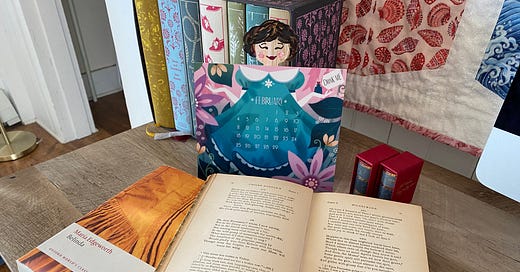Regency Reads and Lenten Reflections
Some February favorites from Maria Edgeworth, Lord Byron, and Magnificat
“Belinda, my dear, will you have the charity to look over some of these letters for me, which, as Marriott tells me, have been lying in my writing table this week - expecting most unreasonably, that I should have the grace to open them. We are always punished for our indolence - as your friend Dr. X— said the other day - if we suffer business to accumulate, it drifts with every ill wind like snow, till at last an avalanche of it comes down at once and quite overwhelms us.”
Lady Delacour is tardy in answering her correspondence in Maria Edgeworth’s Belinda, and I fear I have been tardy in sharing my Febregency updates this month! The overlap of the readathon and the liturgical season of Lent is partially responsible for that - I try to limit my Internet usage throughout Lent - but although I haven’t been posting much, I have been reading my way deeper into the Regency era!
It’s been a huge delight to revisit Belinda. The novel1 follows the adventures of Belinda, a young lady just launched into the high society of early nineteenth century London. Thanks to the machinations of her aunt, she’s been invited to stay with the rich, fashionable, and endlessly witty Lady Delacour, whose life seems to be one long round of thoughtless gaiety - but Belinda has a simplicity and clarity of character which allow her to soon perceive that Lady Delacour deserves more pity than envy. I love how Belinda’s straightforwardness calls out the best in those around her.
Edgeworth weaves societal commentary into her interesting character portraits and scenarios, and many of the topics and insights do carry over to issues which still occupy us today - but my favorite reflections are the human home truths sprinkled into the characters’ conversations. Here’s one great observation Clarence Hervey makes when he is eager - and also a bit afraid - to hear his mentor Dr. X—’s opinion of a certain lady.
“To punish you for wincing at my first setting out, I promise you, that if the lady have a million of faults, each of them as high as huge Olympus, I will see them with the eye of a flatterer - not of a friend.”
“I defy you to be so good, or so bad as your word, Doctor,” said Hervey. “You have too much wit to make a good flatterer.”
“And perhaps you think too much to make a good friend,” said Dr. X—.
“Not so,” said Clarence, “I would at any time rather be cut by a sharp knife than by a blunt one. But, my dear doctor, I hope you will not be prejudice against Belinda, merely because she is with lady Delacour; for, to my certain knowledge, she is not under her ladyship’s influence. She judges and acts for herself, of which I have had an instance.”
Hervey is wise enough to recognize the value of the “sharp knife” of honest wit in the hands of a friend, because the best friendships should in fact help you cut out the undeserving parts of your personality that ought to go. However, too much “wit” can have its drawbacks as well, as Dr. X— hints and as we see in the case of Lady Delacour. There is so much to appreciate and notice in this story! I’m so looking forward to our book club discussion of Belinda this Sunday, February 25 at noon eastern.
My other main read this month thus far has been Childe Harold’s Pilgrimage by Lord Byron, which is absolutely sparking my wanderlust…
Oh, thou Parnassus! whom I now survey, Not in the phrensy of a dreamer’s eye, Not in the fabled landscape of a lay, But soaring snow-clad through thy native sky, In the wild pomp of mountain-majesty! What marvel if I thus essay to sing? The humblest of thy pilgrim passing by Would gladly woo thine Echoes with his string, Though from thy heights no more one Muse will wave her wing. Oft have I dreamed of Thee! whose glories name Who knows not, knows not man’s divinest lore: And now I view thee – ‘tis alas! with shame That I in feeblest accents must adore. When I recount thy worshippers of yore I tremble, and can only bend the knee; Nor raise my voice, nor vainly dare to soar, But gaze beneath thy cloudy canopy In silent joy to think at last I look on Thee!
I’ve now traveled through Spain and Greece with Childe Harold, and I’m looking forward to continuing the journey! My edition has wonderful footnotes from Byron’s friend, the Irish poet Thomas Moore, which fill in many details and reference the letters and journals Byron wrote during the trip that inspired the poem. Childe Harold fits my Febregency travel-inspired challenge as well as the We Love Jenny Readathon. There are a few more books that I’m hoping to pick up before the end of the month for the other Febregency challenges, but the challenges aren’t the only thing that’s new this year. We now have an official Febregency TAG video!
You may have already caught this upload on YouTube; it’s been so much fun to see other booktubers take on the tag and answer the questions! Here’s the full list of prompts below.
Name your top three Regency authors.
Name your top three Regency poets.
Name your favorite historical event that happened during this time period (in Britain or elsewhere).
The year is 1816. It’s a dark and stormy night on Lake Geneva. You’re telling ghost stories with three legendary writers. Who are they? (Bonus points if they’re Regency era writers)
The Regency era is named after the regency of George, Prince of Wales, who ruled in the stead of his father King George III from 1811 to 1820. If you had to appoint a “regent” to “rule” your booktube channel (or substack!) in your stead, who would it be?
Much literature of the Regency period is categorized as “Romantic.” What word would you use to describe today’s literature?
Shakespeare’s plays were popular during the Regency. What artistic performance have you recently enjoyed? (Movies, TV, and music can all count!)
The Regency period was characterized by high fashion. What is a current fashion or trend in the book community that you adore or detest?
Jane Austen’s novels show us the importance of etiquette in the drawing rooms of Regency England. Tell us about your personal rating system.
If you’re interested in doing the tag but aren’t on YouTube, feel free to share your answers in a Substack post or in the comments below!
And speaking of videos and YouTube vs. Substack, I would be interested to know how you subscribers prefer to watch my videos - or if you don’t particularly watch the videos and instead prefer to read the written pieces. Cast your vote in the poll below to let me know!
I’m hoping to put together a Febregency reading vlog towards the end of the month, so keep an eye out for that! I was just marveling over the fact that last year I managed to do weekly Febregency vlogs - and I was also getting out The Book of Cymbeline II: A Kitten’s Tale from Fall to Winter last February. But every year and every season have their own rhythms - and last year, Lent started a little later. Lent is such a good time to withdraw and reflect. It’s a time of fasting and repentance, but it can also be such a fruitful time. I loved this excerpt from a recent piece in Magnificat from Anthony Esolen.
Many of us think of Lent as a gloomy time, what the poet Chaucer called “the drought of March,” a season of lean fare. Yet there’s a nice ambiguity in the English word gloom: it’s related to a host of old words that have to do not with darkness but with light: glimmer, glisten, gleam, glow, and even gladness. And our word Lent, too, suggests a growing light, because it names the season when the days lengthen. Imagine, then, thinking of Lent as a season of increasing vision, more brilliant clarity.
I’ll leave you with just one more Magnificat snippet from Elisabeth Leseur. She calls Lent a “graced time” and reflects on the power that just “the crucifix and some books” have to transform your inner life…
I have just made a short meditation and my resolutions for this graced time. I want to practice recollection, penance, and charity. Recollection, which can exist in the midst of busyness and exterior obligations from which, less than any other woman, I can excuse myself. The soul can be a cell as white and empty of worldly influence as the cell of a monk. The crucifix and some books - that is to say, God and work is what fills the solitude of nuns and monks; this is what can make a woman who is completely flooded with noise and activity, solitary.
Excuse me, I should call Belinda a “moral tale” rather than a “novel” - Maria Edgeworth herself renounces the title of “novel” in an advertisement preceding the work, making me wonder if it was exactly that advertisement which Jane Austen had in mind when she wrote against those who write against novels in Northanger Abbey: “If the heroine of one novel be not patronized by the heroine of another, from whom can she expect protection and regard?”







I have no preference where you share your lovely videos; either place is fine.💕 I didn't get around to reading Belinda this month, but now I really want to after reading your thoughts on it! I'll have to read it belatedly and listen to the book club chat afterwards.😊